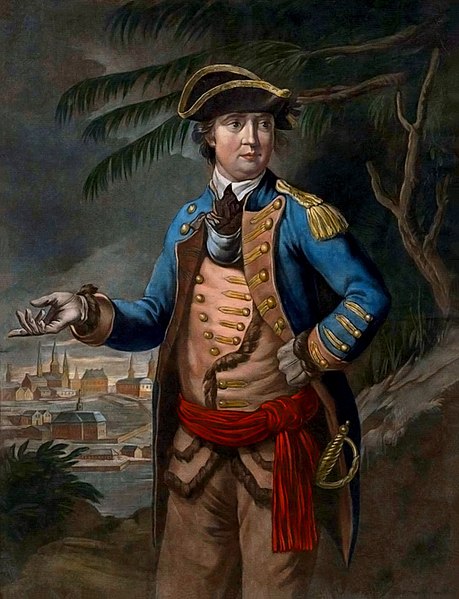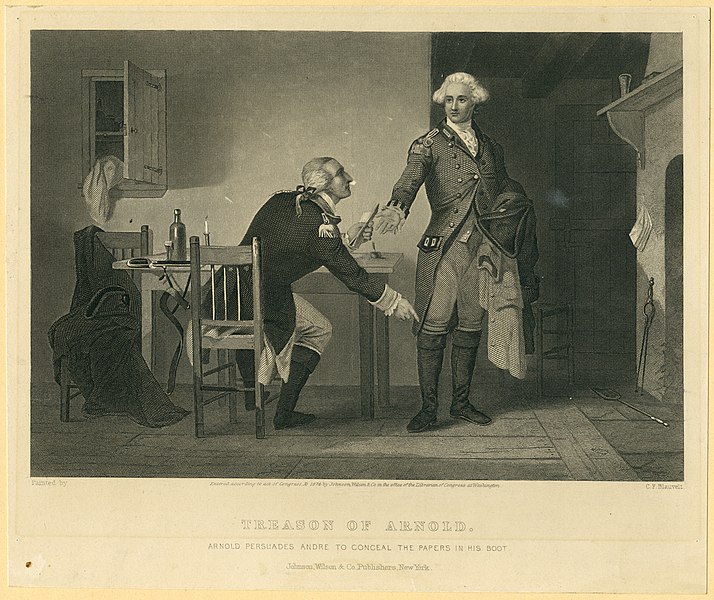Benedict Arnold is a name that is deeply ingrained in American history as one of the most infamous figures of the Revolutionary War.
Born in 1741, Arnold initially fought for the American Continental Army and played a crucial role in key victories, including the Battle of Saratoga.
However, his story took a dramatic turn when he switched sides and betrayed the American cause. This betrayal and his subsequent service to the British army have made him synonymous with treachery and betrayal.
Despite his earlier contributions, Benedict Arnold’s name remains a cautionary tale and a reminder of the complexities and contradictions of war and human nature.
Benedict Arnold Facts
1. Benedict Arnold was born on January 14, 1741, in Norwich, Connecticut
Benedict Arnold was born on January 14, 1741, in Norwich, Connecticut, in the American colonies. He was the second of six children born to Benedict Arnold Sr. and Hannah Waterman King.
Also Read: Benedict Arnold Timeline
Arnold came from a well-established New England family and received a basic education. His father was a successful businessman, but financial misfortunes later plagued the family.

2. Arnold initially fought for the American Continental Army during the American Revolutionary War
Arnold initially fought for the American Continental Army during the American Revolutionary War and played a crucial role in several key victories, including the battles of Saratoga in 1777. Arnold displayed great military skill and bravery during the war.
At the Battle of Saratoga, his tactical leadership and bravery helped secure a crucial victory for the American forces. His actions at Saratoga are often considered a turning point in the war, as the American victory led to France’s formal alliance with the United States.
3. Despite his early successes, Arnold became disillusioned with the American cause
Despite his early successes, Arnold became disillusioned with the American cause and developed a bitter resentment towards some of his fellow officers and politicians.
He felt undervalued and overlooked for promotions and felt that he was not receiving the recognition he deserved. Arnold had a reputation for being ambitious and impulsive, which sometimes clashed with other officers.
He also faced financial difficulties and was accused of profiteering, further straining his relationship with his peers. These frustrations contributed to his growing discontent and ultimately played a role in his decision to betray the American cause.
4. In 1780, Arnold made the controversial decision to switch sides and join the British
In 1780, Arnold made the controversial decision to switch sides and join the British. He conspired to surrender the American fort at West Point, New York, to the British forces in exchange for money and a commission in the British Army.
Arnold’s plan to betray West Point was motivated by a combination of factors, including his financial troubles, his growing resentment towards the American cause, and his belief that the British offered him better prospects and recognition.
He communicated his intentions to the British through his wife, Peggy Shippen, who had loyalist sympathies and connections.

5. Arnold’s plan to surrender West Point was discovered when the American Major John André was captured with incriminating documents
Arnold’s plan to surrender West Point was discovered when the American Major John André, who was acting as an intermediary, was captured with incriminating documents. André was caught by American militia forces while traveling back to British lines.
The papers found on him exposed the plot and implicated Arnold. However, Arnold managed to escape capture by boarding a British ship before the authorities could apprehend him. Major André, unfortunately, was subsequently hanged as a spy.
6. Arnold served the British during the remainder of the war
Arnold served the British during the remainder of the war, leading raids against American forces and assisting in the capture of strategic locations.
As a brigadier general in the British Army, Arnold participated in several military campaigns, including the raids on Virginia and Connecticut. He led British forces in brutal campaigns, causing destruction and devastation to American communities.
However, his actions failed to turn the tide of the war significantly. While he achieved some minor victories, Arnold’s efforts were largely overshadowed by other major events of the war and did not lead to a decisive advantage for the British.
Despite his military skills, his reputation as a traitor preceded him, and he never regained the respect or trust of either side.
7. After the war, Arnold settled in England with his wife, Peggy Shippen, whom he had married during his time as an American officer
After the war, Arnold settled in England with his wife, Peggy Shippen, whom he had married during his time as an American officer. Arnold faced financial difficulties and struggled to find acceptance in British society.
He attempted various business ventures but struggled to regain the wealth and status he had once enjoyed. His reputation as a traitor and his past actions made him a figure of suspicion and distrust, both in England and in the United States.

8. Arnold’s treasonous actions during the Revolutionary War led to his name becoming synonymous with treachery and betrayal
Arnold’s treasonous actions during the Revolutionary War led to his name becoming synonymous with treachery and betrayal. The name “Benedict Arnold” has been used to describe traitors or turncoats in popular culture.
His betrayal deeply impacted American society, and his name has carried a negative connotation ever since. However, it’s worth noting that Arnold’s actions should not overshadow his earlier contributions to the American cause, where he displayed considerable skill and bravery.
9. Despite his actions, Arnold’s contributions to the early American cause cannot be overlooked
Despite his actions, Arnold’s contributions to the early American cause cannot be overlooked. Prior to his betrayal, he played a significant role in some key American victories.
Arnold’s military skills were highly regarded, and his bravery and strategic thinking helped secure important victories for the American forces, particularly at the Battle of Saratoga.
This battle, often seen as the turning point of the war, boosted American morale and convinced the French to join the war effort.
10. Benedict Arnold died in London, England, on June 14, 1801, at the age of 60
Benedict Arnold died in London, England, on June 14, 1801, at the age of 60. He is buried in St. Mary’s Churchyard, Battersea. Despite his role as a traitor, his name remains a significant part of American history and a reminder of the complexities and contradictions of the Revolutionary War era.
Arnold’s story serves as a cautionary tale and a reminder of how personal grievances, ambition, and resentment can lead to devastating consequences. While Arnold’s actions stained his legacy, his earlier contributions to the American cause should not be forgotten, highlighting the complex and often nuanced nature of historical figures.
